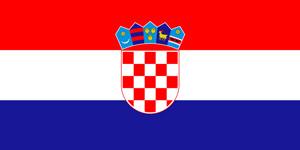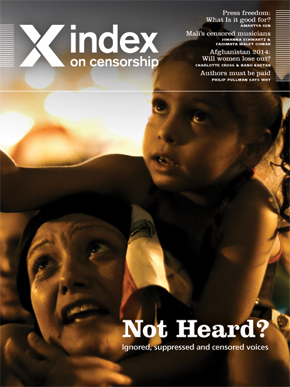1 Jul 2013 | Europe and Central Asia
 At the stroke of midnight on Sunday, Croatia officially became the 28th member of the European Union. Croatia will be a “serious, responsible and active member”, said President Ivo Josipovic as he ushered in “the first day of our European future”. But threats to freedom of expression, especially in the media, remain.
At the stroke of midnight on Sunday, Croatia officially became the 28th member of the European Union. Croatia will be a “serious, responsible and active member”, said President Ivo Josipovic as he ushered in “the first day of our European future”. But threats to freedom of expression, especially in the media, remain.
While the 2012 accession referendum was passed with the lowest ever turnout in a prospective member state, and enthusiasm has since waned further, today is a momentous occasion for a country that was at war only two decades ago – and still grapples with the aftermath. However, with the European Commission regarding freedom of expression a ‘key indicator’ for a country’s readiness to join the union, we should acknowledge that while Croatia has taken some important steps forward, there is work left to do.
The constitution guarantees freedom of expression and the press, and Croatia has recently seen a modest increase in its Freedom House global press freedom ranking, from 78 in 2009, to 64 this year. However, this comes after a significant tumble from 41 in 2007. Croatian journalists, especially those covering war crimes, organised crime and corruption, face continued threats to their well-being and livelihoods.
OSCE media freedom representative, Dunja Mijatovic has repeatedly expressed concerns about public broadcaster HRTs apparent practice of silencing critical journalists. Most recently, in March this year, journalists Denis Latin, Katja Kusec and Ruzica Renic were fired from HRT in suspicious circumstances.
In 2008, Ivo Pukanic, a journalist covering organised crime, intelligence and war profiteering was killed by a car bomb outside his office. It was the third attempt on his life, and also killed his associate Niko Franjic. Six men were convicted for the murders in 2010, but it is still unknown who commissioned the assassination.
This is far from the only attack on Croatian media. In 2007, journalist Zalko Peratovic was detained and his house searched for violating state secrets after publishing a story on war crimes on his blog. Owner of Nova TV, Ivan Caleta, and former media mogul Miroslav Kutle, have both been shot at. Ninoslav Pavic, co-owner of Croatia’s biggest publishing house had his car bombed. Andrej Maksimovic, editor of OTV, has been attacked twice. This handful of examples goes some way in explaining the overall environment of fear and intimidation that has chilled press freedom and consequently freedom of expression in Croatia.
But challenges to freedom of expression exist outside of the realm of the media too. While prison sentences for defamation were abolished in 2006, libel is a criminal offense punishable by fines. Given the country’s recent history, hate speech is not taken lightly. Hate speech based on race, religion, sexual orientation, nationality, ethnicity, or unspecified ‘other characteristics’ are punishable by up to five years in prison — three years if committed over the internet. Insulting ‘the Republic of Croatia, its flag, coat of arms or national anthem’ can bring up to three years in prison.
Unlike neighbouring countries Croatia has not banned gay pride parades, but freedom of assembly for Croatia’s LGBT population has still be under threat. When a parade was organised for the first time in Split in 2011, the small number of participants were pelted with eggs and rocks by thousands of counter-protesters. The police also failed to investigate an attack on six young men and women in the aftermath of the parade. Authorities have also come under fire for failure to investigate persistent acts of vandalism aimed at the country’s minority Serbian Orthodox community.
Despite this, some aspects of freedom of expression have improved recently. This year’s Zagreb pride parade saw its biggest turnout ever, as 15,000 people attended the peaceful march. In another positive development, this February, parliament adopted a Freedom of Information Act. A new body will be set up, specifically dedicated to freedom of expression, with greater focus on public interest and proactive publishing of information.
Croatian leaders and EU politicians have taken pains to stress that accession does not automatically solve the country’s problems. While they were largely referring to the economic situation, the same principle goes for freedom of expression. You only have to look to EU members like Hungary to see that membership alone does not necessarily improve media freedom. For Croatia, as with other recent additions to the union, membership is merely an initial, tentative step towards increased political and civil rights for its citizens.
1 Jul 2013 | Uncategorized


The upcoming autumn issue of Index on Censorship magazine brings together articles from writers including Amartya Sen, Philip Pullman, Jonathan Dimbleby and Peter Kellner, and covers India, China, Brazil, South Africa, Honduras, Colombia, Afghanistan and Mali. Under discussion are development and free speech; ignored voices; digital media; reporters under fire in South America. Get the upcoming issue of Index on Censorship magazine, due to be published on 20 September, by subscribing here or downloading the iPad app.
A report from China is one of many which looks at groups of people around the world who are ignored, censored or supressed by their governments, and whose voices are not heard or are ignored:
As millions of people move from the countryside to Chinese cities they end up as “invisible members of society”. The article by Jemimah Steinfeld and Hannah Leung looks at the use of hukou, a household registration document, to control society, but also to keep rural migrants as second class citizens, who have little access to state benefits and education as well as poorly paid jobs. Most are afraid to criticise the system because of their status.
Hukou are registered to the place where they are born, restricting those rights if anyone choosing to move around the country. Shanghai, for instance, now has 10 million residents who have moved from the country, and cannot access the same services as official residents.
Also in the upcoming issue:
Nobel Prize winner Amartya Sen writes on democracy, the media and free speech
Philip Pullman on copyright and why authors need to get paid
Reports on violent attacks against journalists in Honduras and Colombia
Click here to subscribe, or download the app here
1 Jul 2013 | Campaigns, Digital Freedom, Europe and Central Asia
The revelations that the United States allegedly spied on European Union diplomats marks a low in what should be a special relationship of trust between major democracies. The EU needs to remind the US that surveillance is unacceptable in the digital age.
The row was prompted by revelations published by German magazine Der Spiegel on its website this past Saturday. Relying on documents allegedly leaked by the former NSA-contractor Edward Snowden, the magazine said the NSA had surveilled EU, French, German and Italian diplomatic offices in Washington and at the UN.
Instead of reminding US authorities of the EU belief in an open and free internet, Catherine Ashton, the high representative of the EU for foreign affairs and security policy, focused on the specific press reports, calling them a “matter for concern”. The European Union needs to reiterate its well-established position that “global connectivity should not be accompanied by censorship or mass surveillance.”
But French president Francois Hollande demanded the US stop its activities “immediately.” Later, the BBC reported that Hollande threatened to derail US-EU trade pact negotiations over the bugging scandal.
Germany’s government summoned the US ambassador to explain his country’s actions. Steffen Seibert, spokeperson for Chancellor Merkel, said that Germany wants “trust restored. We will clearly say that bugging friends is unacceptable.”
French foreign minister Laurent Fabius demanded an explanation “as soon as possible” after labelling the alleged spying unacceptable.
Martin Schulz, president of the EU Parliament warned that the allegations, if true, would have a “severe impact on the relations between the EU and the US. He demanded a fuller account of the Der Spiegel reports.
Thomas Drake, a former NSA employee turned whistleblower, who was prosecuted under the US espionage act tweeted today that the alleged spying had “little to do with classic eavesdropping. Instead, it’s closer to a complete structural acquisition of data”.
Index CEO Kirsty Hughes said:
“As disagreement grows between the EU and the US over surveillance, Index on Censorship calls for the EU to take a lead in condemning mass surveillance – which the EU’s cyberstrategy already warns against. We are also calling on the US government to acknowledge that the mass surveillance of citizens’ private communications is unacceptable and a threat to both privacy and freedom of expression.”
1 Jul 2013 | Europe and Central Asia, News, Religion and Culture
The European Union Foreign Affairs Council last week released its guidelines on promoting and protecting religious freedom. The guidelines, designed to set standards for the EU’s external dealings, make, for the most part, encouraging reading, Padraig Reidy writes
The section on free expression sets out thus:
“Freedom of religion or belief and the freedom of expression are interdependent, interrelated and mutually reinforcing rights, protecting all persons — not religions or beliefs in themselves — and protecting also the right to express opinions on any or all religions and beliefs.”
The distinction made here between protecting “persons” as opposed to “religions and beliefs in themselves” is very important, boiling down to the simple notion that individuals have rights but ideologies don’t.
Further on, the guidelines suggest that the EU will recall, when appropriate, that the right to freedom of religion or belief, as enshrined in relevant international standards, does not include the right to have a religion or a belief that is free from criticism or ridicule.
As an argument against modern versions of blasphemy laws: laws which claim to “protect religious feelings”. Russia recently passed such a law, criminalising “public actions expressing clear disrespect for society and committed with the goal of offending religious feelings of the faithful”. The Organisation of Islamic Conference, meanwhile, is seeking to have “defamation of religion” recognised at United Nations level. Any EU attempt to curb this move is somewhat undermined by the fact that the OIC has copied its definition of blasphemy from Ireland’s 2009 Defamation Act.
The guidelines suggest that the EU should resist attempts to curb religious speech as long as there is not a “prima facie case that this expression constitutes hates speech”. But they do also raise the expectation that Europe should condemn any violence carried out in relation to “offensive speech”.
The European Platform on Religious Intolerance and Discrimination (EPRID) has welcomed the guidelines. In a statement, it said:
“Promoting freedom of religion or belief is therefore not only a moral or legal obligation, but also a strategic political choice. The adoption of these Guidelines today gives a strong signal that [it] is now a priority for the EU.”
 At the stroke of midnight on Sunday, Croatia officially became the 28th member of the European Union. Croatia will be a “serious, responsible and active member”, said President Ivo Josipovic as he ushered in “the first day of our European future”. But threats to freedom of expression, especially in the media, remain.
At the stroke of midnight on Sunday, Croatia officially became the 28th member of the European Union. Croatia will be a “serious, responsible and active member”, said President Ivo Josipovic as he ushered in “the first day of our European future”. But threats to freedom of expression, especially in the media, remain.

